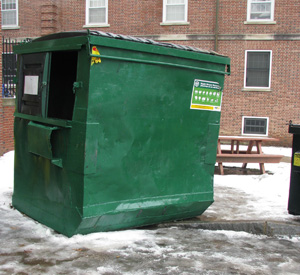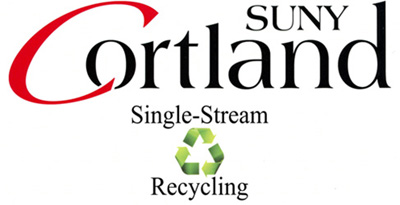Campus Adopts Single-Stream Waste Recycling

01/29/2013
Life just got simpler for everyone on campus with respect to trash and recycling.
Sorting reusable refuse is out at SUNY Cortland.
Single stream is in. The policy was adopted by Cortland County on Jan. 1. The campus received its specialized dumpsters on Jan. 28 and began the transition immediately.
Students, faculty and staff will see fewer large, green bins in hallways and outside buildings and the instructions are easier to follow:
If it looks like garbage — for example, it’s uneaten food — throw it in the trash can.
If it looks like it can be recycled, in most cases everything belongs in the former paper recycling bin, located close at hand under most work stations.
“So now I can put everything into this container right under my desk, my glass bottles, my plastic bottles, my cans as well as my paper and cardboard,” said Phil Connery, assistant project coordinator for the Physical Plant Department, who is spearheading the College’s transition to single stream recycling.
“It makes recycling more convenient,” Connery said. “And there’s less thought in it now; you don’t have to think any more about what you can and can’t combine. Leave the work of separation to the recyclers to handle.”
Single stream recycling is actually cheaper and the initiative enlists the campus community to do its part in supporting the College’s commitment to environmental sustainability, he noted.
Banished are the paper-only totes. From now on, most recycle streams can be mixed together, or “co-mingled” in recycle-speak, into one container. That’s right. Office paper and cardboard no longer have their own container and all can nestle together with glass, plastic, tin, aluminum and steel in the same basket.
Conscientious recyclers don’t need to gather giant bottle collections in preparation for that long walk to the building’s shared large bottle tote, Connery said, referring to one such personal stash he had seen recently.
“People are still being asked to empty their own full recycle bin in the central tote,” while custodians continue to handle the trash, Connery said. “Students in the residence halls will continue to handle both their own trash and recycling.”
Outside the buildings, custodians will bring the building’s accumulated reusables to new, single stream green recycling dumpsters.
Connery urges less fussiness: that vacant cardboard pizza box can find a new use, even if stained with pizza sauce and cheese, as long as no leftover slices linger. Put it in the bin for co-mingles. Ditto the glass or plastic drink and other food containers that are empty, even if they aren’t washed first before combining with paper items.
“If it’s a very small percent of liquid still in the container, it doesn’t matter,” Connery said. “But if it’s half a container, go to the bathroom or drinking fountain and dump it first and then put the container in the recycling bin. They don’t have to be rinsed. It’s the same thing with the yogurt container. They don’t have to be rinsed or licked clean.
“If people think they have to run and rinse it out, they are less likely to recycle it,” Connery said. “We want them to empty it and put it in the recycling container.”
There is no need to peel paper labels off containers before tossing them in the basket. Office receptacles will remain in their places but it’s a good idea to peel off and dispose in the trash the outdated “recyclable paper” label from the recycling bin to prevent confusion over the new policy.
Waste Management, the campus’ trash and recycling contractor, collects several times per week and takes garbage to the County Landfill for disposal at $60 per ton. The hauler drops off the recyclables at the Cortland County Recycling Center.
Casella Waste Systems, which operates the county’s recycling center as a transfer station, will take the mixed, reusable waste to a facility near Geneva, N.Y., where a complicated human and mechanical sorting system will separate the paper, plastic, metal and glass stream into piles of profit.
“It’s all handled at a very large sorting and recycling facility and is very interesting to watch,” Connery said. “It involves a system of conveyor belts, magnets, vibration machines and also hand sorting.”
Waste Management charges the College for transporting the recyclables but not a cent for the disposal.
“Environmentally it’s more practical, but it saves money too,” Connery said.
 |
A slight cost reduction of roughly $2,000 per year results from the reduced carbon footprint of having fewer kinds of trucks coming to campus. A specialized truck for sortables is no longer needed.
The single stream recycling effort continues a campus-wide initiative launched in 2007 by SUNY Cortland President Erik J. Bitterbaum when he became a charter signatory to the American College and University Presidents’ Climate Commitment.
Moreover in 2010, the College vowed as an institution to embrace the principle of “maximizing resources” as one of four overall commitments to excellence, along with “academic excellence,” “transformational education” and “well-being.”
College physical plant managers believe the move to single stream recycling will save lots of money, which then can be put to better use, such as for academic and student life programs, maintaining campus facilities and supporting student scholarships.
But the College only can stop throwing money away on landfill tipping fees if campus community members succeed in increasing the amount of recyclables diverted from the dump.
“The critical component in this endeavor seems to be educating the entire campus community about this important change in our sustainability efforts,” Connery said. “Through emails, newsletters, publications, posters, flyers, seminars and other means, we hope initially to reach everyone and continue to remind them of the importance of single stream recycling and the importance of getting it right.”
The acceptable materials that can be recycled include: newspapers; magazines; catalogs; telephone directories; soft-covered books; direct mail and envelopes of all types; all office paper; cardboard boxes; pizza boxes; brown paper bags; paperboard including cereal boxes, pasta boxes, shoe boxes, egg cartons; milk and juice cartons, both paper and plastic; aseptic packaging including waxed cardboard and foil-lined juice boxes; aerosol cans; plastic bottles; and plastic containers labeled for recycling from 1 to 7; milk jugs and soda, juice and water bottles of glass or plastic with caps; bleach, detergent and shampoo bottles; flexible mixed plastic containers such as for cottage cheese, margarine or yogurt; glass bottles and jars of all colors; empty aluminum cans and containers including pie plates and trays; aluminum foil; metal cans of tin or steel with lids; and unmarked rigid plastics such as buckets, laundry baskets, chairs and toys.
Most items that aren’t acceptable for reuse should be discarded in the trash.
Unacceptable as recyclables are: plastic bags; food liners; window or auto glass; mirrors; light bulbs; dishes; Pyrex ware; ceramics; hard cover books; foam plastic (Styrofoam); hazardous material; universal waste, which includes mercury containing devices such as thermostats, batteries, electronic items, paints; recyclables containing significant food waste; paint; chemicals or oils; coat hangers; microwave trays; plastic film or shrink wrap; anti-freeze containers; small appliances such as toasters; and cookware such as pots and pans.
Composting and special recyclables: The College’s Auxiliary Services Corporation (ASC) is working on a system of composting the biodegradable dinnerware items dispensed exclusively at Hilltop. ASC separates recyclables at Neubig Hall but counts on campus consumers to properly dispose of items taken from the dining areas.
The College, through its Property Control Office and Service Group, continues to collect specific recyclables separately, including batteries, certain electronics, printers and cameras.
More information about what college campuses can do to reduce the carbon footprint can be found at Waste Management's website. For more information, contact Connery at 607-753-2101.

